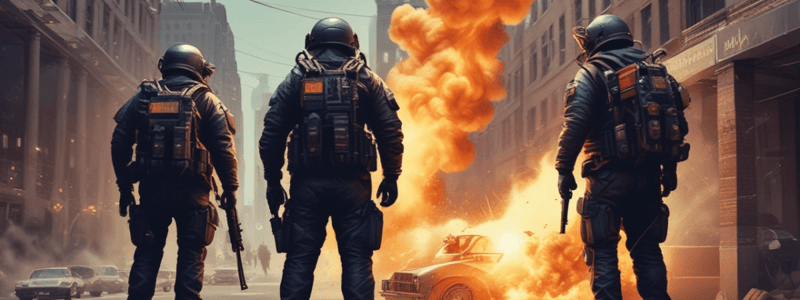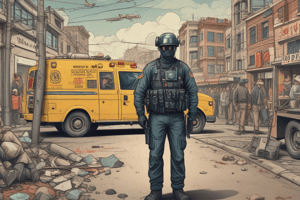Podcast
Questions and Answers
When should the Bomb Squad be notified?
When should the Bomb Squad be notified?
- In all incidents where a suspected or known explosive device is discovered (correct)
- When a suspicious item is found during a routine patrol
- Only in cases where an explosion has occurred
- When a bomb threat is made against a residential dwelling
What is an example of a mobile target that would require Bomb Squad notification?
What is an example of a mobile target that would require Bomb Squad notification?
- A shopping center
- An aircraft (correct)
- A residential dwelling
- A government building
Why should radios and cellular phones be used with caution during bomb threat response incidents?
Why should radios and cellular phones be used with caution during bomb threat response incidents?
- To prevent communication equipment from inadvertently causing a detonation (correct)
- To quickly summon additional units to the scene
- To ensure that all responders are on the same radio frequency
- To prevent officers from being distracted by personal calls
What should an officer do when dispatched to a bomb threat?
What should an officer do when dispatched to a bomb threat?
Under what circumstances should the Bomb Squad be utilized in response to a bomb threat targeting a building?
Under what circumstances should the Bomb Squad be utilized in response to a bomb threat targeting a building?
Who should be located, identified, and interviewed by officers responding to a bomb threat?
Who should be located, identified, and interviewed by officers responding to a bomb threat?
What should officers do if they identify a suspicious item during a bomb threat search?
What should officers do if they identify a suspicious item during a bomb threat search?
What is the purpose of the National Guidelines for Bomb Technicians?
What is the purpose of the National Guidelines for Bomb Technicians?
Where should the Command Post be established if possible?
Where should the Command Post be established if possible?
Who should make the decision to evacuate a premises on a bomb threat?
Who should make the decision to evacuate a premises on a bomb threat?
What should officers do immediately upon arrival at the scene of an explosion?
What should officers do immediately upon arrival at the scene of an explosion?
What should be done if a potential explosive device is found?
What should be done if a potential explosive device is found?
Who should be contacted to assess the hazards in the immediate area of the explosion?
Who should be contacted to assess the hazards in the immediate area of the explosion?
What should be turned off within 300 feet of a suspected explosive device?
What should be turned off within 300 feet of a suspected explosive device?
What should be considered when establishing a safety perimeter?
What should be considered when establishing a safety perimeter?
What information should be provided to Communications when a suspected explosive device is found?
What information should be provided to Communications when a suspected explosive device is found?
Who is responsible for assuming command of the scene of a post-explosion incident?
Who is responsible for assuming command of the scene of a post-explosion incident?
What should be done with anyone who has seen the device/explosive?
What should be done with anyone who has seen the device/explosive?
What is the minimum perimeter that should be established around the location of the device?
What is the minimum perimeter that should be established around the location of the device?
What should supervisors ensure before allowing officers to enter the inner perimeter area?
What should supervisors ensure before allowing officers to enter the inner perimeter area?
What should be done to preserve the scene of an explosion?
What should be done to preserve the scene of an explosion?
Who should handle explosive or military ordnance of any type?
Who should handle explosive or military ordnance of any type?
Who should be contacted for assistance with decontamination?
Who should be contacted for assistance with decontamination?
What is the first supervisor's responsibility at a legitimized bomb threat?
What is the first supervisor's responsibility at a legitimized bomb threat?
What should be considered when establishing a perimeter around the location of the device?
What should be considered when establishing a perimeter around the location of the device?
What should be done with anyone who has seen the device/explosion?
What should be done with anyone who has seen the device/explosion?
What should be conducted in the area after a suspected explosive device is found?
What should be conducted in the area after a suspected explosive device is found?
Why should officers be aware of the possibility of secondary devices and/or explosions?
Why should officers be aware of the possibility of secondary devices and/or explosions?
What is the recommended distance for setting the initial perimeter at an explosion scene?
What is the recommended distance for setting the initial perimeter at an explosion scene?
Who should be consulted before filing criminal charges related to explosives?
Who should be consulted before filing criminal charges related to explosives?
What type of charges may be filed during an investigation involving explosives?
What type of charges may be filed during an investigation involving explosives?
Why is it important to properly file criminal charges related to explosives?
Why is it important to properly file criminal charges related to explosives?
When should Department personnel contact the on-call Bomb Squad supervisor?
When should Department personnel contact the on-call Bomb Squad supervisor?
What type of expertise is required to properly file criminal charges related to explosives?
What type of expertise is required to properly file criminal charges related to explosives?
Flashcards are hidden until you start studying
Study Notes
Bomb Squad Notification and Response
- The Bomb Squad must be notified of and respond to:
- Bomb threats made at mobile targets (e.g. aircraft, trains, watercraft)
- Incidents where a suspected or known explosive device is discovered
- Explosive emergencies
- All incidents where an explosion has occurred
- Scenes where suspected explosives have been located or recovered
Use of Radios/Cellular Phones during Bomb Related Incidents
- The use of radios/cell phones during bomb threats/response incidents is a subjective matter that balances risk vs. benefit
- It is permissible to leave radios/cell phones on during a bomb threat search or life-saving measures at explosion scenes, but not near suspected items
- If a suspicious item is identified, do not transmit from a position near the item
Bomb Threats and Found Explosive Devices
- Officers responding to a bomb threat and/or who find a potential explosive device must follow guidelines outlined in this section
- Bomb Threats:
- Advise Communications of arrival 1-2 blocks from the location
- Locate, identify, and interview key personnel (e.g. person in charge, person who received the threat)
- Evaluate the validity of the threat
- Evacuate the premises or area if necessary
- Search for potential explosive devices
- Found Explosives/Suspect Devices:
- All equipment within 300 feet of the suspected device must be turned off
- Notify a supervisor and request additional assistance
- Establish a minimum perimeter of 300 feet around the location and evacuate the area
- Set up an initial Command Post
Supervisor Responsibility
- The first supervisor on the scene to a legitimized bomb threat should:
- Assume command of the scene
- Establish the primary Command Post
- Establish an outer perimeter if necessary
- Order an evacuation if necessary
- Contact the responding bomb techs and brief them on the information about the device/explosive
- Execute all suggestions of the bomb techs and await their arrival
Response to Explosion/Bombing Incidents
- When an explosion has occurred, responding officers should:
- Immediately don PPE upon arrival
- Attempt an up-wind approach if feasible
- Notify a supervisor and request assistance
- Establish a safety perimeter and evacuate anyone in the immediate area
- Have Communications contact the Bomb Squad and Duty Commander
- Set up an initial Command Post with other emergency services providers
- Be aware of the possibility of secondary devices and/or explosions
Crowd Control and Scene Preservation
- Only authorized personnel with a legitimate need shall be permitted access to the scene
- Spectators and other unauthorized individuals shall be excluded to a safe distance
- Steps should be taken to preserve the scene, including setting an initial perimeter at 1.5 times the distance from the site of the explosion to the farthest found piece of debris
Criminal Charges Relating to Explosive Devices and Explosive Incidents
- Criminal incidents involving explosives, hoax devices, improvised explosive devices, explosive ordnance, or deadly conduct involving explosives are often investigated in conjunction with or deferred to federal partners (e.g. ATF, FBI)
- Properly filing criminal charges demands advanced training and specialized expertise
- When the Bomb Squad responds to or receives contact about explosive materials, officers and detectives must consult with Bomb Squad personnel and obtain their authorization before filing any criminal charges
Studying That Suits You
Use AI to generate personalized quizzes and flashcards to suit your learning preferences.




